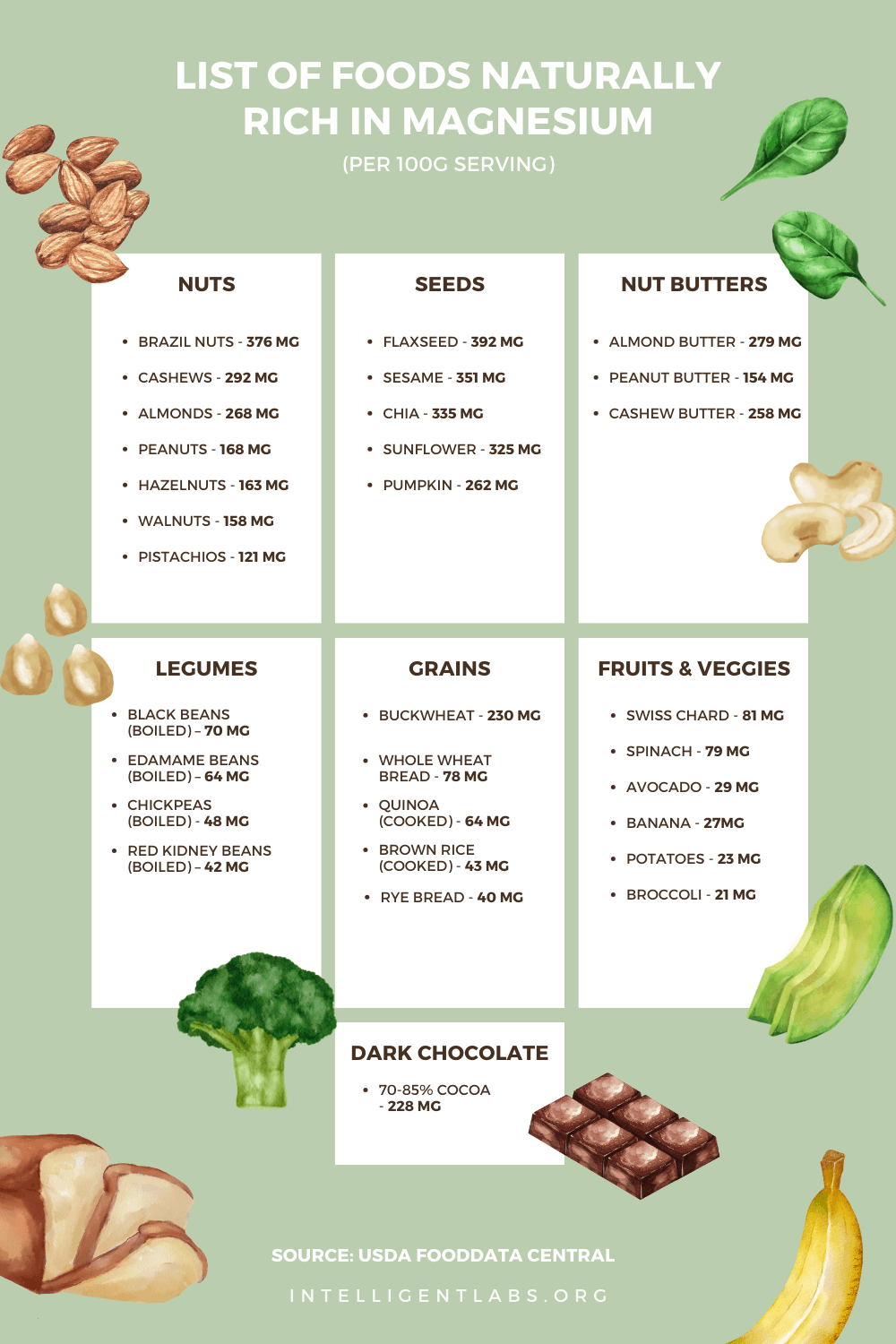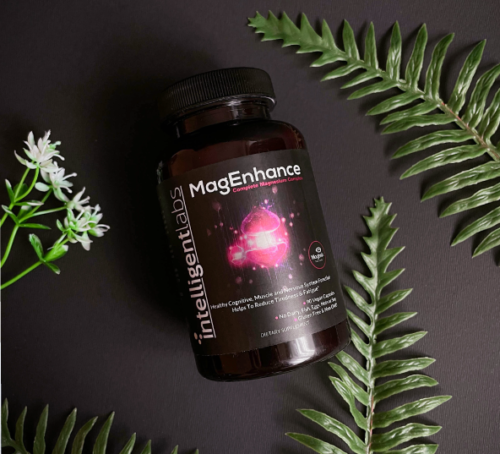Nutrition
Ultimate Guide To The Best Magnesium Supplement
To say that Magnesium (Mg) is an important mineral is an understatement. It’s literally required in hundreds of chemical reactions in the body! Sadly, magnesium deficiency is common. But here’s the good news: the best magnesium supplement, like our MagEnhance Triple Magnesium Complex may help raise levels in the body.
In this blog post, we’ll examine the benefits of taking magnesium supplements – and why you need to take them in the first place!
Table of Contents
How Common Is Magnesium Deficiency?
Even though magnesium is so important, many people don’t get enough of it. Averages vary by country. But even in the richest nations on Earth, as many as 70-80% of people are unknowingly deficient.1
Deficiency is usually misdiagnosed because magnesium in your blood serum makes up only 1% of the amount present within your body. In fact, 80%-90% of it is in your muscles and bones. This makes it hard to estimate exactly how many people have deficiencies.2
Low Magnesium Symptoms: 12 Signs You May Be Deficient
Here are the most common signs you may be lacking in magnesium:3 4
- Muscle cramps & spasms
- Migraines and headaches
- Insomnia
- Brain fog & memory problems
- Osteoporosis & brittle bones
- Tooth decay
- Erectile dysfunction
- Constipation
- Irregular heartbeat
- Anxiety & depression
- Fatigue
- Appetite loss
Extreme cases may include seizures and convulsions.
Note: If you even have a few of these symptoms, it may not be due to deficiency. Many of the symptoms appear in other disorders, too. Don’t self diagnose. Talk to your doctor.
What Are Examples of Magnesium-Rich Foods?
While the best magnesium supplements may help boost your health, they don’t taste nearly as good as natural food sources. Nuts, seeds, legumes, grains, fruits, and veggies are all great sources of this mineral.5
Here’s a graphic showing the foods richest in magnesium in various categories:

What Are The Benefits of Taking Magnesium Supplements?
The list of magnesium benefits is very long, but these are some of the most notable ones:
- Calms nerves & anxious thoughts6
- Reduces the time before falling asleep & increases sleep quality, sleep length, melatonin levels & renin levels7
- Boosts energy8
- Lowers inflammation9
- Relieves muscle spasms & cramps related to having low Mg levels10
- Improves circulation, blood pressure & heart health11
- Becomes a woman’s best friend during PMS episodes12 13
- Aids memory & learning14
- Prevents bone fractures when Mg levels are not too high or too low 15
- Supports joint health & cartilage maintenance16
- Aids waste removal & draws water to the intestines, keeping you regular17
- Enhances sports performance & muscle recovery 18
- Reduces the need for asthma inhalers19
- Reduces the risk of insulin resistance20
What Are The Types of Magnesium Included In MagEnhance?
Our Intelligent Labs MagEnhance Complete Magnesium Complex features 3 different types of magnesium. All are easily absorbable forms with the lowest chance of side effects.
Magnesium Taurate
This is a salt made of magnesium and the amino acid, taurine. It’s best known for helping with heart health and for calming the mind.21 22 23

Water breaks it down into magnesium ions and taurine. Both have strong affinities with GABA receptors.24 25 Both compounds also support the heart and blood circulation and help improve cognition.
GABA is the neurotransmitter that calms mental activity and helps you relax. Without it, you cannot relax or sleep.
Lack of sleep can cause many health problems, as you already know, but did you know that lack of sleep can even make you fat? Yes, so next time you feel guilty about snoozing on the couch, give yourself a break because naps are good for you.
Magnesium L-Threonate
This compound was developed by researchers at MIT and two other universities. Their goal was to create a compound that crosses the blood-brain barrier and elevates Mg levels in the brain and spine.
Magnesium L-threonate – which is patented under the brand name, Magtein – is known for improving memory and cognition and for calming anxious and restless thoughts. People also use it to reduce migraine symptoms.
The blood-brain barrier keeps most nutrients, drugs, and toxins from entering the brain through the bloodstream. Magnesium L-threonate gets into the brain easily.26 This makes it the ideal form for improving brain function.
Magnesium Glycinate
Widely touted for being one of the most bioavailable forms, Mg Glycinate is used to ensure healthy levels of magnesium throughout the entire body. It doesn’t cross the blood-brain barrier, though. But that isn’t a problem with MagEnhance because we also added Mg L-Threonate to our formulation. So, they complement each other very well.
The combined glycine and magnesium help to calm the mind.27 Moreover, this form is also known for being easy on the digestive system. Magnesium supplements might trigger diarrhea and other symptoms if you take too much. It’s usually temporary. Those who continue to have these problems with other forms often report fewer or no issues with Mg glycinate.28
Want to know more about the differences between these 3 forms of magnesium in MagEnhance? Check out our in-depth blog post: Magnesium Glycinate vs L-Threonate vs Taurate: What’s The Difference?
How Much Magnesium Can You Safely Take Each Day?
Adult men typically need 400mg-420mg. For non-pregnant adult women, that number drops to 310mg-320mg. Pregnant women need 350mg to 360mg per day.29
Excessive alcohol use and some diseases may lower the amount your body uses. High zinc consumption may also interfere with absorption. You may consume larger amounts of magnesium or take a high-absorption supplement like magnesium glycinate to compensate.
Overdosing on magnesium is normally not a big deal. You may get diarrhea, but your kidneys – assuming they’re healthy – will get rid of the excess.
Upper limits may vary according to different government agencies and professional associations. But don’t stray too far from the recommended daily intake without consulting a doctor.
Are There Any Side Effects or Interactions to Worry About?
The most common side effects are loose stools and digestive discomfort. Sometimes that’s temporary, and your body just needs to get used to it. It could also mean you consumed too much and should lower your daily dose.
Nausea and vomiting could also happen, but these side effects are less common.
Serious Side Effects
Serious side effects are rare. They include allergic reactions, dangerously low blood pressure, confusion, slow breathing, and coma. Most of these symptoms could mean you have accumulated too much magnesium in your body too quickly. If you experience any of them, get medical attention immediately.30
Interactions
Magnesium may lower the effectiveness of antibiotics. The same goes for bisphosphonates, which are used for osteoporosis. Excessive doses of zinc may block magnesium absorption. So may chronic excessive alcohol use.
Conclusion
To conclude, magnesium is absolutely vital for our bodies, being involved in hundreds of biochemical reactions. Unfortunately, millions of people are deficient, leading to various symptoms.
The good news is that supplements may help raise levels in the body and provide many benefits. Since MagEnhance contains 3 different types of absorbable magnesium, it may be an effective way to optimize your health.
Don’t let magnesium deficiency hold you back. Start taking MagEnhance – the best magnesium supplement – sooner rather than later!
💬 Something on your mind? Share your thoughts in the comments. We love hearing from curious minds.
📩 And while you’re here, join our newsletter for more smart stuff (and secret perks)!
References
- DiNicolantonio, James J, et al. “Subclinical Magnesium Deficiency: A Principal Driver of Cardiovascular Disease and a Public Health Crisis.” Open Heart, vol. 5, no. 1, Jan. 2018, p. e000668, https://doi.org/10.1136/openhrt-2017-000668. ↩︎
- Schwalfenberg, Gerry K., and Stephen J. Genuis. “The Importance of Magnesium in Clinical Healthcare.” Scientifica, vol. 2017, 2017, pp. 1–14, https://doi.org/10.1155/2017/4179326. ↩︎
- National Institutes of Health. “Office of Dietary Supplements – Magnesium.” National Institutes of Health, 2016, ods.od.nih.gov/factsheets/Magnesium-HealthProfessional/. ↩︎
- Cleveland Clinic. “Magnesium-Rich Food Information | Cleveland Clinic.” Cleveland Clinic, 2014, my.clevelandclinic.org/health/articles/15650-magnesium-rich-food. ↩︎
- U.S. Department of Agriculture. “FoodData Central.” Usda.gov, 2019, fdc.nal.usda.gov/index.html. ↩︎
- “Magnesium for Anxiety: How You Can Fight Anxiety and Feel Better.” Healthline, 20 Mar. 2019, www.healthline.com/health/magnesium-anxiety. ↩︎
- Abbasi, Behnood, et al. “The Effect of Magnesium Supplementation on Primary Insomnia in Elderly: A Double-Blind Placebo-Controlled Clinical Trial.” Journal of Research in Medical Sciences: The Official Journal of Isfahan University of Medical Sciences, vol. 17, no. 12, 1 Dec. 2012, pp. 1161–1169, pubmed.ncbi.nlm.nih.gov/23853635/. ↩︎
- de Baaij, Jeroen H F, et al. “Magnesium in Man: Implications for Health and Disease.” Physiological Reviews, vol. 95, no. 1, 2015, pp. 1–46, https://doi.org/10.1152/physrev.00012.2014 ↩︎
- Mazur, Andrzej, et al. “Magnesium and the Inflammatory Response: Potential Physiopathological Implications.” Archives of Biochemistry and Biophysics, vol. 458, no. 1, Feb. 2007, pp. 48–56, https://doi.org/10.1016/j.abb.2006.03.031. ↩︎
- “Magnesium for Depression | Psychology Today.” Www.psychologytoday.com, www.psychologytoday.com/us/blog/evolutionary-psychiatry/201801/magnesium-depression. ↩︎
- Harvard Health Publishing. “Key Minerals to Help Control Blood Pressure – Harvard Health.” Harvard Health, Harvard Health, 3 May 2019, www.health.harvard.edu/heart-health/key-minerals-to-help-control-blood-pressure. ↩︎
- Fathizadeh, Nahid, et al. “Evaluating the Effect of Magnesium and Magnesium plus Vitamin B6 Supplement on the Severity of Premenstrual Syndrome.” Iranian Journal of Nursing and Midwifery Research, vol. 15, no. Suppl 1, 1 Dec. 2010, pp. 401–405, pubmed.ncbi.nlm.nih.gov/22069417/. ↩︎
- Quaranta, S., et al. “Pilot Study of the Efficacy and Safety of a Modified-Release Magnesium 250 Mg Tablet (Sincromag) for the Treatment of Premenstrual Syndrome.” Clinical Drug Investigation, vol. 27, no. 1, 2007, pp. 51–58, https://doi.org/10.2165/00044011-200727010-00004 ↩︎
- Zhang, Chengxiang, et al. “A Magtein®, Magnesium L-Threonate, -Based Formula Improves Brain Cognitive Functions in Healthy Chinese Adults.” Nutrients, vol. 14, no. 24, 8 Dec. 2022, p. 5235, https://doi.org/10.3390/nu14245235. ↩︎
- Castiglioni, Sara, et al. “Magnesium and Osteoporosis: Current State of Knowledge and Future Research Directions.” Nutrients, vol. 5, no. 8, 31 July 2013, pp. 3022–3033, https://doi.org/10.3390/nu5083022 ↩︎
- “Vitamin and Mineral Guide for Arthritis | Arthritis Foundation.” Www.arthritis.org, www.arthritis.org/health-wellness/treatment/complementary-therapies/supplements-and-vitamins/vitamin-and-mineral-guide-for-arthritis ↩︎
- O’Neill , Terri . Magnesium for Constipation. Michigan Medicine, University of Michigan, Mar. 2021, www.med.umich.edu/1libr/MBCP/Magnesium.pdf ↩︎
- Zhang, Yijia, et al. “Can Magnesium Enhance Exercise Performance?” Nutrients, vol. 9, no. 9, 28 Aug. 2017, p. 946, https://doi.org/10.3390/nu9090946 ↩︎
- Bokhari, Syed A., et al. “Role of Intravenous Magnesium in the Management of Moderate to Severe Exacerbation of Asthma: A Literature Review.” Cureus, vol. 14, no. 9, 7 Sept. 2022, https://doi.org/10.7759/cureus.28892. ↩︎
- National Institutes of Health. “Office of Dietary Supplements – Magnesium.” Nih.gov, 2016, ods.od.nih.gov/factsheets/Magnesium-Consumer/. ↩︎
- Heffley, James, et al. “To Your Health.” Www.austinchronicle.com, www.austinchronicle.com/columns/2006-01-27/329491/. ↩︎
- Shrivastava, Parikshit, et al. “Magnesium Taurate Attenuates Progression of Hypertension and Cardiotoxicity against Cadmium Chloride-Induced Hypertensive Albino Rats.” Journal of Traditional and Complementary Medicine, vol. 9, no. 2, 2 June 2018, pp. 119–123, www.ncbi.nlm.nih.gov/pmc/articles/PMC6435948/ ↩︎
- McCarty, M.F. “Complementary Vascular-Protective Actions of Magnesium and Taurine: A Rationale for Magnesium Taurate.” Medical Hypotheses, vol. 46, no. 2, Feb. 1996, pp. 89–100, https://doi.org/10.1016/s0306-9877(96)90007-9. ↩︎
- Ochoa-de la Paz, Lenin, et al. “Taurine and GABA Neurotransmitter Receptors, a Relationship with Therapeutic Potential?” Expert Review of Neurotherapeutics, vol. 19, no. 4, 20 Mar. 2019, pp. 289–291, https://doi.org/10.1080/14737175.2019.1593827. ↩︎
- Poleszak, Ewa. “Benzodiazepine/GABA(A) Receptors Are Involved in Magnesium-Induced Anxiolytic-like Behavior in Mice.” Pharmacological Reports: PR, vol. 60, no. 4, 1 July 2008, pp. 483–489, pubmed.ncbi.nlm.nih.gov/18799816/ ↩︎
- Slutsky, Inna, et al. “Enhancement of Learning and Memory by Elevating Brain Magnesium.” Neuron, vol. 65, no. 2, Jan. 2010, pp. 165–177, https://doi.org/10.1016/j.neuron.2009.12.026. ↩︎
- “The Tips and Uses for Magnesium Glycinate.” Healthline, 4 Jan. 2021, www.healthline.com/health/magnesium-glycinate. ↩︎
- “Magnesium Glycinate: Uses, Benefits, and Side Effects.” Www.medicalnewstoday.com, 27 July 2018, www.medicalnewstoday.com/articles/315372. ↩︎
- National Institutes of Health. “Office of Dietary Supplements – Magnesium.” Nih.gov, 2016, ods.od.nih.gov/factsheets/Magnesium-Consumer/. ↩︎
- WebMD. “Magnesium: Uses, Side Effects, Interactions, Dosage, and Warning.” Webmd.com, 2011, www.webmd.com/vitamins/ai/ingredientmono-998/magnesium. ↩︎





